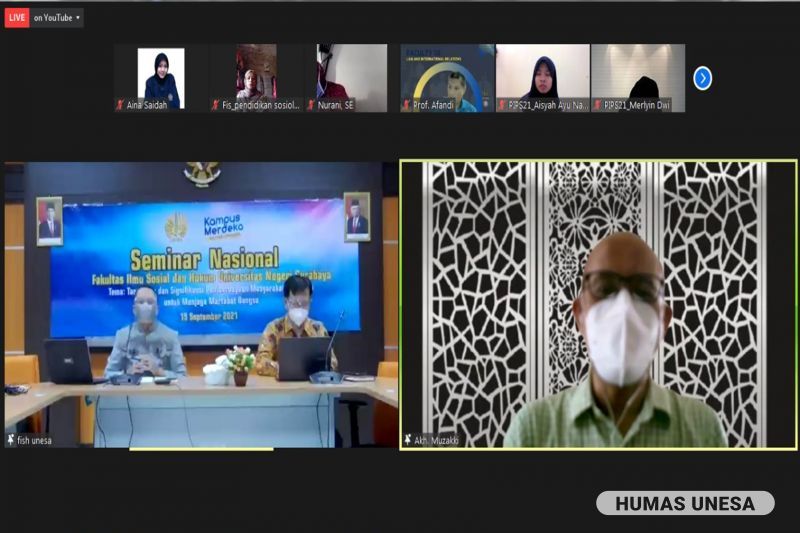
www.unesa.ac.id
Unesa.ac.id, SURABAYA-The Faculty of Social Sciences and Law, State University of Surabaya (UNESA) held a national seminar with the theme “The Challenges and Significance of Empowering Indonesian Society to Maintain National Dignity” on Wednesday, September 13, 2021. The event was held online by presenting three speakers, namely the Dean of FISIP, UIN Sunan Ampel, Surabaya Prof. Ah. Muzakki, M. Ag., Grad.Dip.SEA, M.Phil., Ph.D., and Professor of UniSZA Malaysia Prof. Dr. Mohd Afandi Salleh and Deputy Dean for Academic Affairs FISH, UNESA Dr. M. Turhan Yani, MA. They were accompanied by Ali Imron, S. Sos., MA, a UNESA Lecturer as moderator.
Prof. Dr. Bambang Yulianto, M.Pd., Vice Chancellor for Academic Affairs on that occasion conveyed several messages from the Chancellor of UNESA. According to him, the theme of the seminar is interesting to study at this time; how to empower the Indonesian people in various fields. Therefore, there are three perspectives discussed, namely, (1) empowerment from a sociological perspective, (2) empowerment from a legal perspective, and (3) empowerment from an education perspective.
The various perspectives expressed by these experts complement each other on how the Indonesian people are empowered and what challenges they will face in the future. A strong and empowered society is part of the dignity of the Indonesian nation. "We as part of the component of the nation also have a responsibility to participate in empowering the people of Indonesia," he said.
Through the seminar, he continued, UNESA showed its contribution and played an active role in thinking and providing real solutions in community empowerment. UNESA has always taken that role. When a disaster occurs, for example, UNESA volunteers through the Crisis Center Mitigation Unit (SMCC) immediately go to the location to help with evacuation and mitigation. "Even during this pandemic, UNESA continues to intervene through its programs, alumni, research and students. Even the most UNESA ambassadors for behavior change in Indonesia are involved in assisting the government in accelerating the handling of Covid-19 in the community," he said.
On that occasion, Prof. Muzakki explained about the role of the campus in the context of community empowerment. Why is community empowerment important? Answering this question, the professor invited him to learn from the Covid-19 pandemic, which from the outset brought up various responses from the public. There was even a response that thought Covid-19 was engineered until the rejection of vaccines made it difficult for the government to handle and control the spread of Covid-19. "This issue is very complex and it is a social issue that must be resolved by campuses," he said.
The importance of community empowerment by campuses can be seen in several aspects. (1) The Tridarma Relationship of Higher Education towards a world class university (WCU). (2) social justice state politics. (3) Accessibility to higher education services. (4) Academics are both traditional and organic intellectuals. "Academics must be present to grow with the community, voice the community's voice, and provide solutions to problems faced by the community," he said.
Meanwhile, Prof. Afandi explained that Indonesia has a large population and diverse society. Natural resources are also abundant. According to him, Malaysia has learned a lot from Indonesia, both in terms of culture, history, and science. "From the diplomacy side of the two countries, the relationship is like brother and sister," he said. In an effort to empower, Indonesia and Malaysia can take advantage of opportunities for the advancement of science and technology and globalization. "Indonesian and Malaysian cultural diplomacy need each other, local wisdom as a nation's asset, the advancement of digital economic response, and strong cooperative relations," he said.
From an educational perspective, Turhan Yani first revealed data on KPAI's findings about the high rate of dropouts and "early" marriages during the pandemic. This fact becomes an important part as well as the challenge of community empowerment. Empowerment work in education can be done through the pillars of education, namely; learning to know, learning to do, learning to be, and learning to live together. "This task is certainly not only the task of formal educational institutions, but must be realized together with all elements of the nation," he said.
Empowerment can be realized through the important role of educational institutions; (1) the family or parents as the first place of education for the child, (1) the school or campus as the second institution or extension of the parent's hand in educating the child, and (3) the community as the third educational environment which also determines the growth and development of the child. The influence of social media today can also be an educational 'environment' that needs to be considered in the community empowerment process. "This is a joint task and must be carried out together with the campus, the community, and the state," he said. (Aida)
Share It On:






